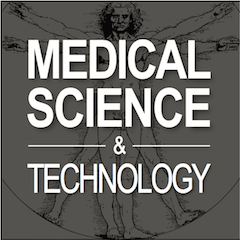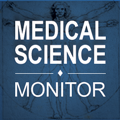Thyroid Hormones and N-Terminal Pro-Brain Natriuretic Peptide (BNP) Predict Heart Failure in Nigerian Hypertensive Patients
Oloruntoba Ayodele Ekun, Daniel A. Folasade, Adebola A. Phillip, Ogundahunsi Omobola
Med Sci Tech 2018; 59:20-26
DOI: 10.12659/MST.908253
Available online: 2018-05-11
Published: 2018-05-11
BACKGROUND:
Thyroid hormones and N-terminal pro-brain natriuretic peptide play critical roles in cardiac function, and the direct relationship between thyroid hormone and blood pressure is well documented. This study was designed to evaluate the ability of thyroid hormones and N-terminal pro-brain natriuretic peptide to predict the risk of heart failure among hypertensive patients in Nigeria.
MATERIAL AND METHODS:
A cross-sectional study was conducted on 212 volunteers (120 age- and sex-matched subjects with hypertension, 53 normotensive subjects as controls, and 39 subjects with heart failure). Blood samples were collected from all subjects after an overnight rest and samples were assayed for thyroid-stimulating hormone (TSH), triiodothyronine (T3), free triiodothyronine (FT3), tetraiodothyronine (T4), free tetraiodothyronine (FT4), and N-terminal pro-brain natriuretic peptide (NT-proBNP) using enzyme-linked immunosorbent assay (ELISA).
RESULTS:
T3, FT3, and NT-proBNP were significantly higher in the hypertensive group than in controls (p<0.001, p=0.020, and p<0.001, respectively). There was a positive and significant association between T3 and T4 (r=0.477, p<0.001), T3, and FT4 (r=0.185, p=0.043). There was a positive but insignificant association between T3 and NT-proBNP (r=0.078, p=0.393). Logistic regression analysis of these hormones predicted risk of heart failure: TSH (odds ratio 2.2611 p=0.0023), FT3 (odds ratio 1.1782 p=0.0014), FT4 (odds ratio 0.3608 p=0.0014) T4 (odds ratio 1.0750 p=0.0209), and NT-proBNP (odds ratio 1.0033 p<0.001).
CONCLUSIONS:
Slight and unnoticed changes in thyroid hormones and elevated N-terminal pro-brain natriuretic peptide in the hypertensive group may expose them to further cardiovascular complications.
Keywords: Hypertension, Natriuretic Peptide, Brain, Thyroid Hormones



